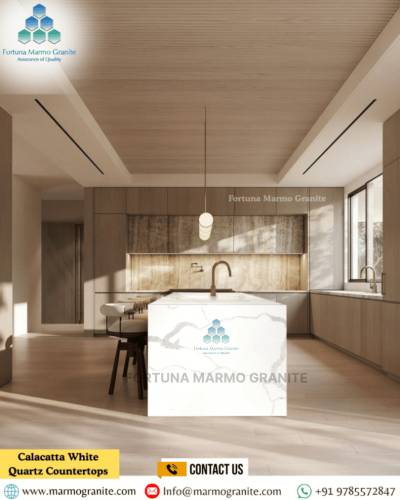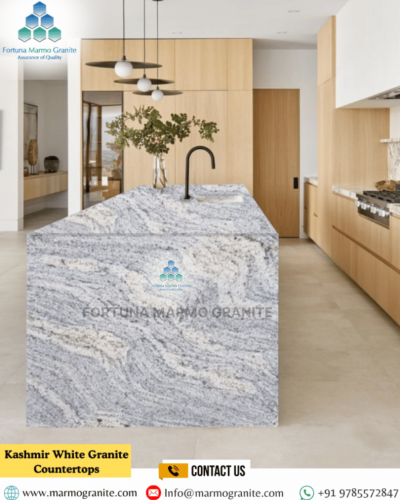Quartz vs. Granite Countertops: Which Stone is Best for Your Kitchen and Why?
Quartz vs Granite Countertops Choosing the perfect countertop for your kitchen is more than a design choice—it defines both atmosphere and function. Countertops endure daily wear, from meal prep and cooking to cleaning and spills. That makes durability and ease of maintenance just as important as visual appeal. Among the many available materials, quartz and granite stand out as two of the most popular options, each with distinct advantages.
Quartz countertops combine natural quartz crystals with resins and pigments. They deliver a uniform look with a wide range of colors and patterns. Many resemble natural stone while offering strong resistance to stains and scratches.
Granite, on the other hand, comes directly from the earth as a natural igneous rock. Each slab showcases unique veining and color variations, bringing unmatched natural beauty. Granite offers exceptional strength and heat resistance, making it ideal for heavy-duty kitchen use.


Unveiling the Composition: Nature's Artistry vs. Engineered Precision
Granite: A Testament to Earth's Power
Granite is a natural stone—an igneous rock formed deep within the Earth's crust through the slow crystallization of magma. This process creates a dense and durable material made up of quartz, feldspar, and mica. The unique mix of these minerals gives each slab its own color variations, patterns, and textures. Every piece becomes a one-of-a-kind work of natural art. Veins, speckles, and swirls in shades ranging from earthy browns and greys to vibrant blues and greens showcase the timeless beauty of granite.
Quartz: Engineered for Performance and Consistency
In contrast, quartz countertops are engineered stones. Manufacturers create them by combining 90–95% ground natural quartz with 5–10% polymer resins and pigments. The mixture is compressed and heated to form solid, non-porous slabs. This process allows precise control over the color, pattern, and texture. Some quartz designs mimic natural stone, while others offer uniform or modern looks not found in nature. Thanks to the added resins, quartz remains non-porous—a key advantage over natural stone.
Aesthetic Appeal: Embracing Natural Variation vs. Controlled Design
Granite: The Allure of Natural Uniqueness
Granite's beauty comes from its natural variations. Each slab tells a unique geological story, shaped over millennia. Homeowners who value individuality and the organic feel of natural stone often choose granite. Its rich veining and speckling bring depth, luxury, and sophistication to both traditional and modern kitchens. However, natural variation means samples can differ from actual slabs. Careful selection ensures the final look matches the desired aesthetic.
Quartz: Versatility and Uniformity
Quartz provides a wider range of design possibilities because of its engineered nature. Manufacturers create consistent colors and patterns, offering a predictable aesthetic. This uniformity works well for homeowners who want a sleek, modern style or large kitchens that need matching slabs. Quartz can also mimic granite and marble, delivering a similar look with added performance benefits. In addition, pigments expand the color options, from vibrant tones to subtle neutrals rarely found in natural stone.
Durability and Resilience: Standing Up to the Rigors of Kitchen Life
Granite: Robustness with a Porous Nature
Granite is a remarkably hard and durable material, resistant to scratches and heat. You can typically place hot pots and pans directly on a granite countertop without fear of damage. However, its natural porosity makes it susceptible to staining from liquids like oil, wine, and coffee if not properly sealed. Regular sealing is essential to maintain its pristine appearance and prevent bacterial growth within the pores. While durable, granite can chip or crack under significant impact.
Quartz: Non-Porous Powerhouse
Quartz countertops excel in durability and low maintenance due to their non-porous nature. The resin binders create a surface that is highly resistant to stains, scratches, and chips. Liquids cannot penetrate the surface, making cleanup a breeze and eliminating the need for regular sealing. This non-porous quality also makes quartz a more hygienic option as it inhibits the growth of bacteria and mold. While generally heat-resistant, prolonged exposure to very high temperatures can potentially damage the resin binders, so using trivets for extremely hot items is still recommended.
Maintenance and Care: Ease of Upkeep for a Busy Lifestyle
Granite: Requires Regular Sealing
Maintaining granite countertops involves regular sealing, typically once or twice a year, depending on the type of granite and the sealant used. Daily cleaning is straightforward with mild soap and water. Promptly wiping up spills is crucial to prevent staining. Avoid using harsh chemicals or abrasive cleaners that can damage the sealant.
Quartz: Effortless Upkeep
Quartz countertops are remarkably low-maintenance. Their non-porous surface resists stains and bacterial growth, requiring only regular cleaning with mild soap and water. Sealing is never necessary. This ease of care makes quartz a popular choice for those seeking a hassle-free countertop solution.
Cost Considerations: Balancing Quality and Budget
Granite: A Wide Range of Price Points
Granite prices can fluctuate considerably based on the rarity and quality of the stone. Entry-level granite can be comparable in price to some mid-range quartz options, while exotic and highly veined granite slabs can be significantly more expensive. Installation costs can also vary depending on the complexity of the project and the fabricator chosen.
Quartz: Generally Consistent Pricing
Quartz tends to have a more consistent pricing structure, although variations exist based on brand, color, and pattern. While some premium quartz options can be as expensive as high-end granite, mid-range quartz often offers a competitive price point. Installation costs are generally similar to granite.
Conclusion
Choosing between quartz and granite countertops for your kitchen is a significant decision that blends practicality with personal style. Quartz countertops are favored for their consistent appearance, non-porous surface, and minimal maintenance requirements, making them an excellent choice for busy households or those who prefer a sleek, modern look with a variety of color options. Both materials have their advantages, and the best choice depends on your lifestyle, design preferences, and how much upkeep you are willing to commit to. Indian Granite Supplier At Fortuna Marmo Granite, we understand the importance of making the right choice for your kitchen, and that's why we offer a comprehensive range of both premium granite and quartz countertops sourced from the finest quarries.
Quartz vs Granite Countertops : With years of industry experience since 2018, our skilled team is dedicated to ensuring that every slab meets the highest standards of quality and finish, providing you with countertops that not only elevate your kitchen's aesthetics but also stand the test of time. Our expertise as a leading Indian granite supplier and exporter allows us to serve customers worldwide with customized solutions tailored to their needs, whether it's for residential or commercial projects. Quartz vs Granite Countertops : Trust Fortuna Marmo Granite to guide you through the selection process and deliver exceptional natural stone products that combine beauty, functionality, and durability to create the kitchen of your dreams.

